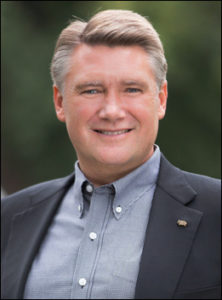By Jim Ellis
Jan. 15, 2019 — The 9th District of North Carolina, still with uncertified electoral results from November, could conceivably remain vacant until the November municipal elections as the situation continues to unfold.
The NC State Board of Elections was supposed to have met on Friday, and at that point would likely have scheduled a new election, but the panel itself is a political football. A state judge acted to dissolve the membership by refusing to issue a stay of his previous ruling.

North Carolina Republican Mark Harris has filed a court challenge to the Board of Elections not certifying his win in NC-9 and claiming his 905-vote lead should stand.
A judge eventually ruled that the legislature acted unconstitutionally regarding some of the changes including the legislation regarding the Board of Elections. The board was supposed to be dissolved after the election certification period, but the NC-9 problem earned the group a stay of the original ruling. The judge, however, did not see fit to allow them to continue in the new year.
At the end of the year, with Republican legislators desiring to change the special election law that would allow an open primary system instead of the general election rerun that would have been the previous board’s only option had they ordered a new vote, a new election law was enacted.
In a deal with the Democrats, the Republican leadership passed a bill that allows the open primary in exchange for giving Gov. Cooper what he wanted in terms of Board of Elections’ personnel. The bill passed overwhelmingly in both houses, but the governor vetoed. The legislature immediately overrode his action.
Republicans wanted the special election change because they could see, considering the negative publicity that race leader Mark Harris has received in relation to the fraudulent voting charges that surround a consultant with whom his campaign contracted, that his chances of defeating Democratic nominee Dan McCready in a rerun election are poor. With an open primary, the GOP leaders will have the opportunity of fielding a potentially stronger candidate.
The law requires the new Board of Elections to be in place by Jan 31. This means we will see no certification action for the 9th District until February at the earliest. Simultaneously, Harris has filed a court challenge to the procedure, claiming his 905-vote lead should stand meaning that certification and swearing into office should follow.
A complicating factor is when a special election would be scheduled. The 9th District contains all or parts of eight counties, some of which have different municipal elections schedules. Therefore, no common date exists throughout the entire district in which to hold a concurrent special election.
Thus, scheduling a stand-alone special could mean that part of the constituency could vote in six different elections this year, if primary run-offs become necessary in both the local and congressional contests. In North Carolina, primary run-offs are required if no candidate receives at least 40% of the vote.
If the board eventually chooses to schedule the special election in conjunction with a municipal calendar, it is likely the special general would not occur until November. Leaving the seat vacant for such a long time would not be unprecedented. Michigan Gov. Rick Snyder (R), for example, adopted such a schedule when Rep. John Conyers (D-Detroit) resigned in December of 2017 and the seat remained without a voting member until immediately after the Nov. 6 general election.
What is clear for the immediate future is that the seat will remain in political limbo for at least the next several weeks, until a new Board of Elections membership can agree upon a certification solution and/or election plan and schedule.
